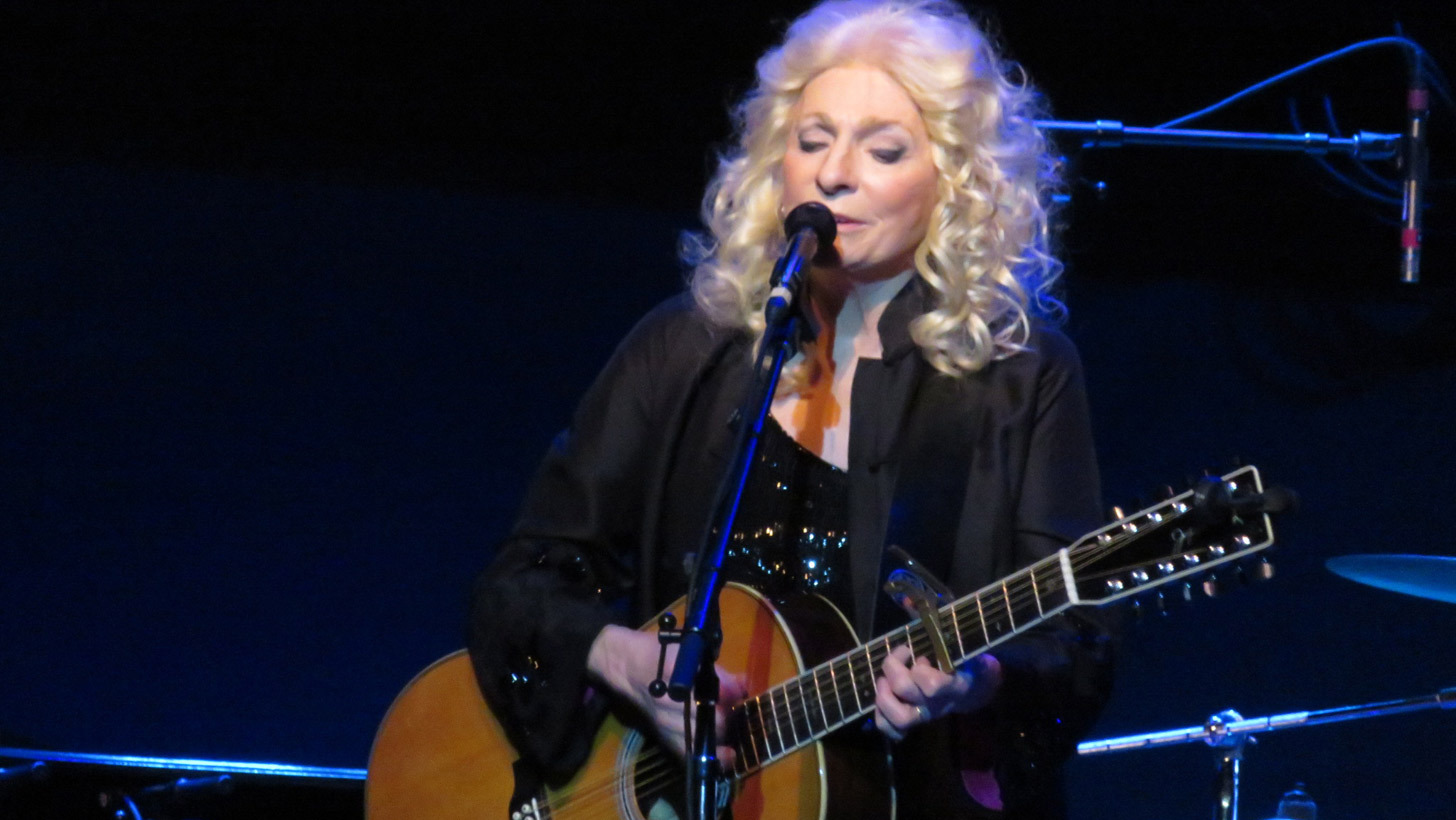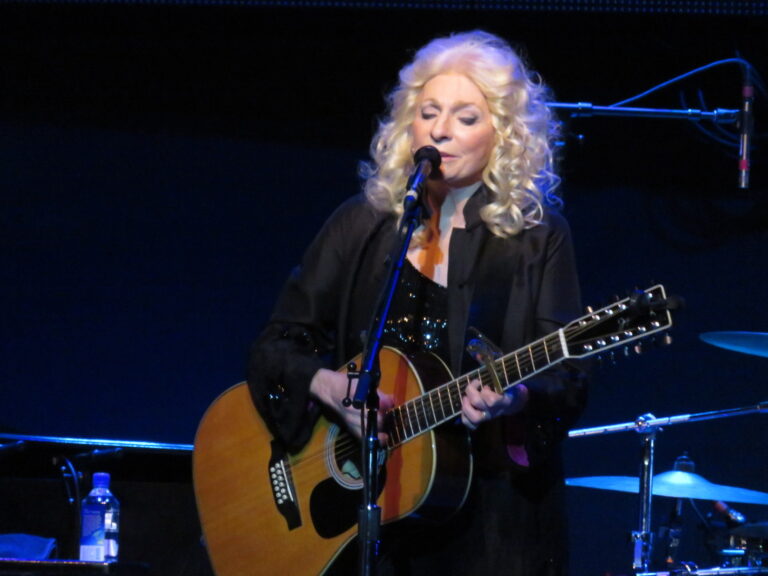August March walked down the street that led from his office to his house, conversing all the while with his alter-ego, Rudolfo Carrillo, who was, in fact, the music editor at Weekly Alibi. As he rolled—and he did roll because he is a sorta Falstaffian sort of dude—he basically wondered to himself, sometimes aloud, how he would angle a piece on ’60s chanteuse Judy Collins. Collins had been a huge presence in America’s nascent folk scene in 1961, later becoming one the the next two decades’ most prolific interpreters of the American song. From the plaintive folk musings of Joni Mitchell to the heady, emotionally complex compositions of Steven Sondheim, Collins was there, providing a resonant listening post to a generation of Americans that mostly included people like March’s parents—Americans who liked their pop music thick and saucy. Of course that community of listeners also included him to some extent, as he had sat there listening intently while being played the singer’s oeuvre by a mother who treasured American folk music as much as he treasured Ween or The Flaming Lips. Subsequently March had moved through Collins’ music respectfully. He was sure of the gravitas, but unsure of the particulars. Sure he knew about Collins as the youthful piano prodigy, of her longtime relationship with Stephen Stills and her concern for worldly causes. But he wanted to know more on that sunny day as he walked toward his chante in downtown Burque.“I tell you what,” said his alter ego. “I hear Ms. Collins and Mr. Stills are going to give a concert near Santa Fe in the next couple of weeks, on Saturday, Sept. 15 as a matter of fact. Why don’t we call her up and find out all about her and her music too. It’s important and I’m sure all the young folks who read Weekly Alibi every week will want to get hep to one of the root-figures of the rocanrol music they so highly dig.” March thought his counterpart was right, so they turned onto Lead Avenue, walked a couple more blocks, had a seat in Carrillo’s luxurious home office and let their fingers do the walking—right into the musical world of Ms. Judy Collins.[Sound of phone ringing]Judy Collins: Hello, Rudolfo. They said you would call. How are you?Weekly Alibi: Well, hello, Judy Collins! I’m fine. You doing well, Ms. Collins?Judy Collins: Yeah, very well, thanks.I have to tell you that I’m honored to talk to you today; I grew up listening to your music because of my mother, mostly.I’m glad that you’ve listened to my work.You’ve been involved with the American popular music scene since, like, 1961. Could you tell our readers a little bit about how that legendary involvement began?Boy, it’s quite a story. I was playing as a classical musician—and also grew up with Rogers and Hart as well as the traditional Irish and English songs that my father sang. So, I had a mixture of music that was always a part of my life; that was very natural, like breathing. It was very eclectic, but classical music was in addition to everything else. We always had recordings of Rachmaninoff playing in the house; the great pianists were always playing.Speaking of excellent pianists, I read that you were considered a piano prodigy as a youth.Yes, I was supposed to be the hope of the great piano teacher Antonia Brico. But then I found folk music when I was about 15. I realized I really didn’t know what folk music was, beyond the traditional forms my father enjoyed. The first folk songs that I found, I found on the radio. My songs were “Barbara Ellen,” sung by Jo Stafford and “The Gypsy Rover,” which was a Leo Maguire song from an Alan Ladd movie called The Black Knight. What’s interesting is that those songs came to me from two totally different realms of American popular culture; one belonged to the movies and Stafford was a traditional pop songstress who sang with a group called the Pied Pipers. Those songs directed me more and more toward folk music, though, and I began to learn about the genre, buy records. I learned to play some of the songs and decided to join a folk music group in Colorado. That’s how my career started and my first folk gigs were in Colorado, too, in Ouray and Central City and Denver. Things were just starting then, but right away I had jobs opening for [American singer, guitarist, songwriter, actor and civil rights activist] Josh White and Bob Gibson, too. Very quickly, I learned about people like Woody Guthrie and Pete Seeger.When you released your first album in 1961, were you still living in Denver or had you already moved to New York City?New York; but then it was Connecticut. My husband at the time got a job—he was a professor at that time, a teacher—at the University of Connecticut. My first gig in New York was at Gerde’s Folk City.Wow, that’s a legendary place. That’s where Bob Dylan had his first show.Exactly. It was there that I signed a contract with Elektra Records, on a handshake. That was in April of 1961 and my first album, A Maid of Constant Sorrow, followed. So it just kind of moved like that, like music playing. And I’ve always been a touring artist since then. I think that in the past 55 years, I might have had 2 years off.Does touring provide listeners with the essential Judy Collins?Um-hum! Well, yes of course.But you’ve also had some huge records in your professional lifetime, which also happens to be my whole lifetime. What led you to record work from artists as diverse as Joni Mitchell or Leonard Cohen and what was so special about the music that resulted?The real thing that has always driven me is the songs I sing. Sometimes I’ve been lucky enough that people bring me great songs to sing, like Sondheim’s “Send in the Clowns.” In a way, it’s part of what happens; listening to songs [of other musicians] is part of the process that happens with me, creatively, with my music. I was the first to interpret and record a lot of people’s work.I note that you recorded one of Pete Seeger’s popular protest songs as the ’60s advanced and you became involved with the protest movement. How did Seeger react to your version?Oh he was wonderful! He’s my friend and through him, I got to know all of that [folk] crowd. A lot of songs came to me [by] sifting through the scene. I was very much in the right place at the right time.I know your career shifted, in a musical sense, with the recording of In My Life, where you sought after a more lush, studied sound. How did that album lead to work like your definitive rendition of Sondheim’s “Send in the Clowns” in the early ’70s?Because I was raised with all kinds of music, classical piano compositions, traditional Irish airs and the pop music of the ’40s and ’50s—I really developed an ear for everything. With Sondheim, it had to do with the words; I was open to anything that was beautiful. “Send in the Clowns” totally fit my vision of what music is. I knew and liked music like that, music from musicals growing up, like “My Funny Valentine.” You’ve also done some work with Stephen Stills and you’re touring with him this fall. Does that current creative association bring back any important memories, diagrams of the age of protest that you still refer to as artistic inspiration?I think we can still rock it. [Laugh] We still rock it. We’re both still active, we’re young at heart and we are both interested in what’s going on culturally and musically in the United States and the world. I think it means something when people come to see us. We’ve never stopped. Never stopped playing, never stopped touring, or stopped talking about what’s happening in our country.What issues are important to you right now?Everything that’s going on. [Laughs]. I don’t want to talk about it right now, but if you come to see my concert with Stephen Stills, you’ll understand. And my audiences know what I write about; what we’ve written about. I think people expect nothing less from me, to continue to be active socially and politically. We all have to do what we can right now and one of the things I think that what is important is to keep being creative, to keep writing music. I think artists are keeping people alive right now; we need music to survive what’s going on.
Judy Collins and Stephen Stills in ConcertSaturday, Sept. 15 • 8pm • $55 to $68Camel Rock Casino Rock Showroom17486 US Highway 84, Santa Fe, N.M.Tickets at camelrockcasino.com










